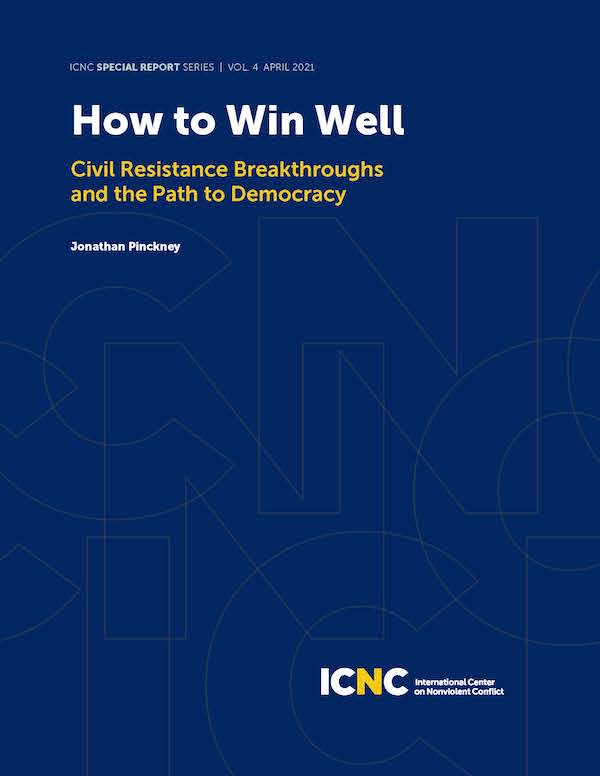Wednesday, April 14, 2021
with author Jonathan Pinckney
Download Dr. Pinckney’s Special Report, ‘How to Win Well’
Webinar Content
Introduction of Speaker: 0:00 – 4:48
Presentation: 4:49 – 32:32
Questions & Answers: 32:33 – 1:03:46
Webinar Description
ICNC hosted Dr. Jonathan Pinckney to discuss his recent research findings on civil resistance and democratization, as published in the ICNC Special Report, How to Win Well: Civil Resistance Breakthroughs and the Path to Democracy.
Civil resistance is a powerful force for democratic transitions, but how can activists navigate the uncertain road from bringing down a dictator to bringing up a more just and free political order? Dr. Pinckney discusses a critical factor: the breakthrough mechanisms (such as negotiations, elections, coups, or international intervention) by which civil resistance campaigns bring down authoritarian regimes. These mechanisms shape the dynamics of the subsequent transition and play a powerful role in promoting or undermining democracy. They help us understand how civil resistance can not just win, but win well.
About the Special Report
How do nonviolent resistance movements oust dictators? What effects do these different ways of ousting dictators have on countries’ long-term political trajectories? In this special report, Pinckney traces the pathways through which civil resistance movements of the last seventy years have removed dictatorships and the impact of these different pathways on levels of democratic progress. Pinckney finds that pathways that involve campaign initiative, institutional mechanisms, and building cooperative norms—particularly negotiated transitions—tend to lead to the highest levels of democratic progress.
About the Presenter
 Jonathan Pinckney is senior researcher for the Program on Nonviolent Action at the United States Institute of Peace, where he conducts applied research on nonviolent action, peacebuilding, and democratization. He is the author of From Dissent to Democracy: The Promise and Peril of Civil Resistance Transitions from Oxford University Press (2020), as well as numerous academic and general outlet articles. He received his PhD in 2018 from the University of Denver.
Jonathan Pinckney is senior researcher for the Program on Nonviolent Action at the United States Institute of Peace, where he conducts applied research on nonviolent action, peacebuilding, and democratization. He is the author of From Dissent to Democracy: The Promise and Peril of Civil Resistance Transitions from Oxford University Press (2020), as well as numerous academic and general outlet articles. He received his PhD in 2018 from the University of Denver.
Recommended Readings
“Lessons on Building Democracy after Nonviolent Revolutions” by Jonathan Pinckney
“How Nonviolent Resistance Helps to Consolidate Gains for Civil Society after Democratization” by Markus Bayer, Felix S. Bethke and Matteo Dressler
“Do Civil Resistance Movements Advance Democratization?” by Maciej Bartkowski
“Do Military Defections Help or Hinder Pro-Democracy Civil Resistance?” by Kara Kingma Neu
“In a Time of Democratic Backsliding, How Should Civil Society Be Supported?” by Hardy Merriman
How Freedom is Won: From Civil Resistance to Durable Democracy, Freedom House Report

